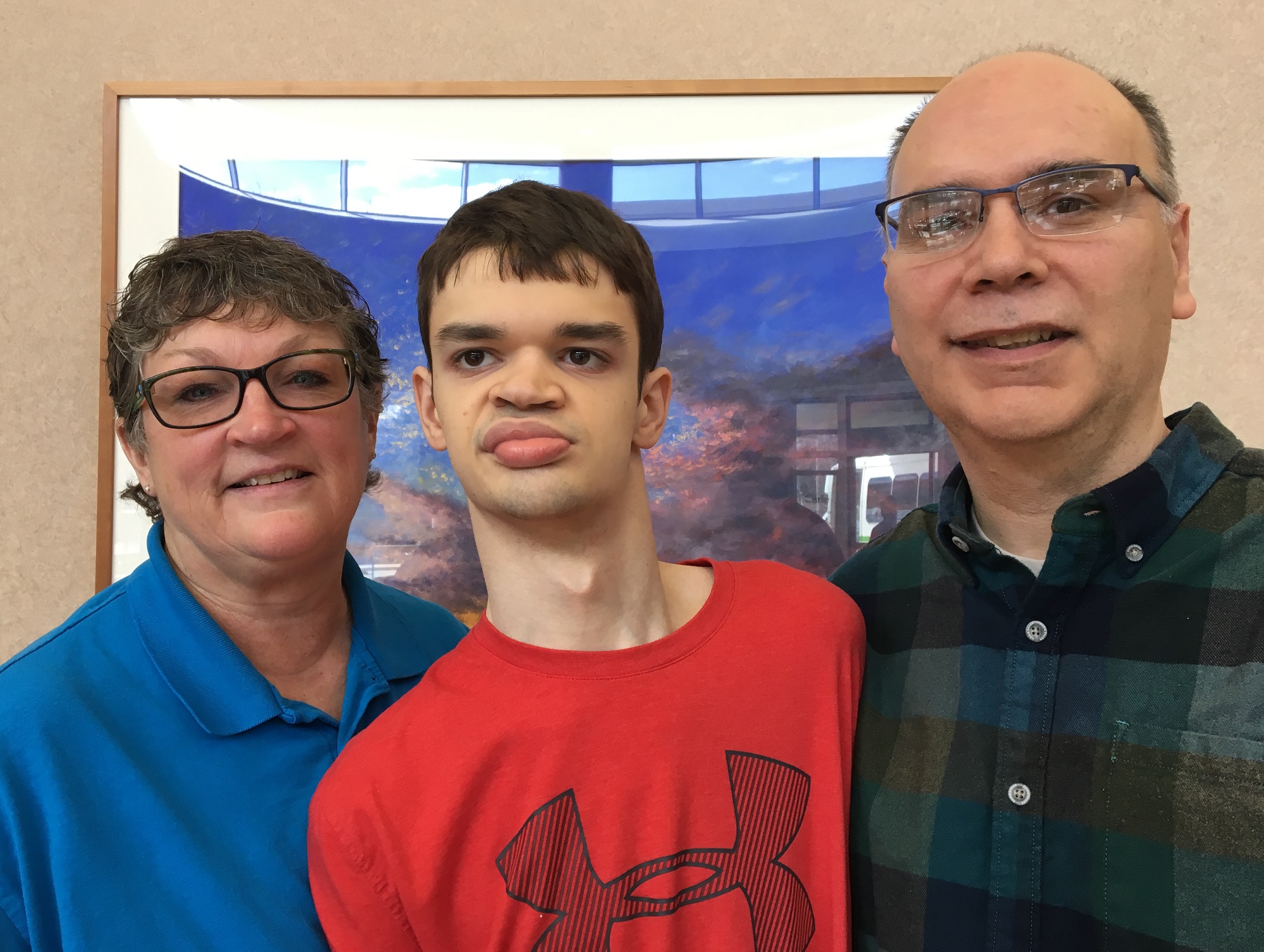For 20-year-old Tanner Welsh, the standard week in Carle’s Epilepsy Monitoring Unit (EMU) wasn’t an option.
Tanner is autistic. He communicates, but he doesn’t talk. And he most certainly doesn’t sit still. In fact, when dad Tim uses the bathroom, Tanner often bolts to grab a book or other forbidden treasure, laughing all the way back to his room.
“He knows what he’s doing. You know it’s in there,” Tim said.
 So Tanner’s epilepsy care team monitored the electrical activity in his brain for three days – with one or both parents always by his side – to help pinpoint where the young man’s epileptic seizures originate. The care team and the Catlin family of three learned Tanner was having multiple seizures an hour while he slept. With medication adjustments, the Welshes have more seizure-free days they hope will last for some time.
So Tanner’s epilepsy care team monitored the electrical activity in his brain for three days – with one or both parents always by his side – to help pinpoint where the young man’s epileptic seizures originate. The care team and the Catlin family of three learned Tanner was having multiple seizures an hour while he slept. With medication adjustments, the Welshes have more seizure-free days they hope will last for some time.
Tanner’s doctor, Graham Huesmann, MD, PhD, played an integral role in Carle Foundation Hospital achieving Level 3 Epilepsy Center accreditation this spring from the National Association of Epilepsy Centers. The designation recognizes Carle’s professional expertise, facilities and commitment to providing the highest level of medical evaluation and treatment for adults with complex epilepsy. <See news release.>
The Welshes couldn’t be happier.
“Dr. Huesmann, his nurse Gina (Murphy, APRN) and the whole team deserve accolades,” said Tanner’s mother, Cheri. “Since Tanner’s epilepsy diagnosis, the team has done a great job holding our hands.
“They admit when they don’t have answers, but they always work to find them.”
Tanner’s seizures arrived with puberty.
“It got worse last summer. He’d black out and fall,” said Tim, adding Tanner wears a soft boxing helmet to school and at other times to help prevent Emergency Department visits for stitches.
The helmet provides some comfort.
“Honestly, epilepsy scares you all the time,” Tim said.
The Welshes say Tanner regresses ability-wise because of the seizures that do damage to precious brain tissue.
They recently learned the results of genetic testing that were heartbreaking while also providing the information they continually gather so they can best help their only child.
“Our life is so we can be with him,” Cheri said. “We’re always learning. We are always asking ‘Why?’ when it comes to testing and treatment options, and no one on Dr. Huesmann’s team ever looks at us like we’re idiots.”
 They know they’re never in it alone.
They know they’re never in it alone.
“We talk with Tanner’s nurse all the time, and there have literally been times we’ve cried on the phone together,” Cheri said. “She always tells us, ‘We’ll get to the bottom of this.’
“We know we’re not a number.”
Murphy makes sure of that.
“It is extremely important to deliver information in ways that the parents can understand and to remember that the parents need to feel and know they are valued as a part of the healthcare team,” the advanced practice nurse said.
“We need to avoid medical jargon. We need to take the time to sit down and allow the parents to process the information and to ask all their questions without feeling rushed.”
The Welshes do know they’re unique, caring for someone who may never be able to care for himself.
“It’s all a fight when you have a special needs family member. I know I won’t be a grandma. I won’t be the mother of the groom. But I have Tanner,” Cheri said, calling her son both upbeat and angelic.
“What 20-year-old still wants to sit on your lap? I’m good with that.”
Categories: Culture of Quality, Redefining Healthcare
Tags: autism, autistic, Carle, epilepsy, Huesmann, monitoring, neurosciences, research, Tanner, Welsh
